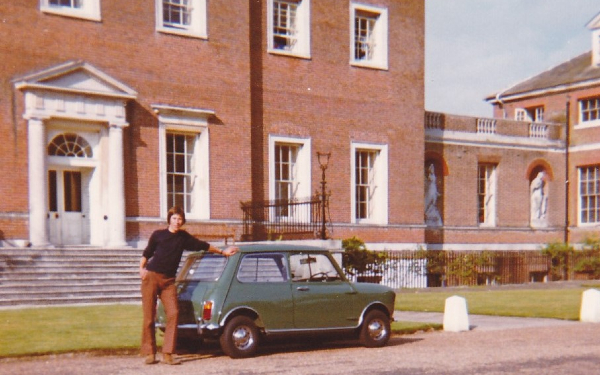
In 1976, Tony Inwood and his brother, Colin, appeared on the front cover of Community Care magazine.
Tony was 23 at the time and had recently left Caldecott, a residential home for children and young people in Kent. Tony had been put into local authority care at the age of six; both his parents had suffered from severe depression, his father having attempted suicide and spent time in psychiatric hospitals. After a time in foster care, Tony lived at Caldecott for eight years.
Forty-eight years after that original Community Care article, Tony has written a book, Flying Under the Radar, about his childhood and time in care, how this led to a breakdown in his early adulthood – and how he has overcome these challenges to reach a place of happiness and security in his life.
What are Tony’s memories now of his time at Caldecott?
Memories of care
“It wasn’t perfect by any means, and some of the care lacked sophistication,” he says. “But on the whole, it was extraordinary. It just had a special kind of spirit about the place. It drew people in. And it was a kind of healing spirit.”
The focus of the original Community Care article about Caldecott was this spirit, and why ex-residents like Tony and Colin would come back for reunions, years after leaving the home.
Tony says that he “enjoyed going back [to Caldecott]. I enjoyed seeing some of the people I knew”, as well as wandering around the grounds of the stately home that housed the Caldecott Community.
However, after leaving the home, he also developed mixed feelings about the place.
He writes: “For some years, there remained a wistful, almost subconscious longing, to go back there, to want to make things better in a way that cannot be done; to continue and develop relationships that were cut off.”
Support after leaving care
One of the biggest challenges was the minimal aftercare provided to young people leaving care at the time. Tony tells me that leaving Caldecott felt “a little bit like being abandoned. Not quite. But if there’d been some kind of extra ongoing support there, that may have helped.”
Tony writes now that: “I believe that aftercare support is crucial to enable young leavers to adapt to life in the outside world and to feel undergirded by the staff and/or social workers as a part of that process.
“For some this may need to last for several years before they are able to feel fully confident and independent. The vital point here is that to get this support it is not only fair and beneficial to them personally, but enables them to play a role in society according to the gifts that each of them have. So, the lack of this is a very sad double loss.”
Social work support
This lack of stability and ongoing support from one person was also a theme in Tony’s experience of social workers – or child care or welfare officers, as they were known at the time.
From the moment I was put into care I had about five [child care officers] altogether. So you just get to know a child care officer, and suddenly they say, ‘Sorry I’m leaving, you’ll get a new one soon’.”
“This was quite common, I think, in those days,” says Tony. And in fact it is still common for children in care to have multiple social workers during their time in care – as care-experienced adults we interviewed for our Choose Social Work campaign told us.
“In fact, originally in the 50s, I think they were called welfare officers,” says Tony. “And standard Caldecott jokes said, ‘They’re not so much welfare officers as farewell officers’, because people had so many of them, which, of course, didn’t help your stability.”
However, despite the lack of a consistent professional to build a relationship with, Tony says the child care officers “were helpful, and they intervened a lot over the problems with my foster parents”.
When his brother, Colin, requested their local authority notes and Tony read these as an adult, he found that, “Looking back, obviously they did quite a lot to help, particularly in times of crisis. So I would certainly say they helped me, definitely, despite the regular changes.”
Advice for staff working with children in care
What advice would Tony give to social workers and other professionals working with children in care now?
“I think the crucial thing, not so much for the social workers themselves but the actual staff [in residential homes], is to be aware of what children are going through,” he says. “And when they’re displaying erratic behaviour or disturbed behaviour, aggression, withdrawal, whatever it is, to know that that’s an alarm bell.”
This wasn’t the case for Tony: when he started drinking towards the end of his time at Caldecott, staff reacted in a fairly unsympathetic way to the symptoms, not the cause, of his behaviour. In Flying Under the Radar, Tony writes:
“The act of getting drunk as far as I was concerned, was not only to relieve my immediate feelings of anger and frustration, but also, I consider in retrospect, as a kind of plea for help. It was a classic case of ‘Not waving, but drowning’, but no one appeared to notice. It may be that no-one could have helped me at that stage. I do not know. They could have tried though, that was the point. They could have referred me to a psychotherapist, they could have tried talking to me, they could have done anything to show me they could see that I was in pain, but they didn’t.”
The value of relationships
If social workers are able to sustain an enduring, long-lasting relationship with a child or young person, it is a “lifeline”, says Tony.
“I think you feel, ‘Somebody’s interested in me’, even if they can’t solve all your problems, which they obviously can’t. But the fact that you know they’re, if you like, there for you, they’re interested, they’re trying to do their best, is enough to give you that encouragement to think, you know, ‘Well I’ll keep going’.”
In a statement, Nick Barnett, CEO of the Caldecott Foundation, which runs the home where Tony lived, said: “Tony was in care in the 1960s. In his book he shares this experience, reflecting on Caldecott as a wonderful therapeutic community.
“Since then, the therapeutic care sector has come to understand much better, through learning from clinical research and offering carefully adapted trauma-informed support to children and care-experienced adults, how the early childhood trauma which Tony experienced is highly likely to have continued to have an impact into his adulthood, despite some more positive elements to his experience.
“It is critical that children and young adults receive therapeutic care that supports them in addressing childhood traumas, losses and possible associated complex attachment issues so that they are able to live fulfilling lives.
“We must continue to support and guide young adults after they have left care. Life continues to throw challenges at us all. Most of us are fortunate to have loving families to support us through this. Sadly, this isn’t the case for many care leavers.”
How residential care has changed
Tony himself adds: “It is amazing how things have moved on in residential care over the last 50 years. The work done now at the Caldecott Foundation, as it is now called, is fantastic. The staff to child ratios are much higher. The therapies that children receive are very intense and staff training has moved on to a very high and sophisticated level. There is also much being done in the way of aftercare, which is so vital.”

Tony Inwood in 2023. Photo: courtesy of Tony Inwood
Today, Tony leads a “fulfilling and happy” life, and he credits this to his “rock solid relationship” with his partner, Simon, for providing a stable and secure home, along with the Christian faith he discovered in his adulthood.
In writing Flying Under the Radar, Tony hopes to demonstrate to anyone who has suffered a traumatic childhood that “there is always the possibility of a better and worthwhile future”.
If he was talking to a child or young person who was struggling now, he would say: “Things can get bad but, you know, there’s always another day, another year, and it may not always be that way.
“If people are really in a bleak situation, they may find that hard to believe, but this is why I think my story is a demonstration of it.”
Flying under the Radar by Tony Inwood is available on Amazon.


 Bournemouth, Christchurch and Poole
Bournemouth, Christchurch and Poole  Hampshire County Council
Hampshire County Council  Lincolnshire County Council
Lincolnshire County Council  Norfolk County Council
Norfolk County Council  Northamptonshire Children’s Trust
Northamptonshire Children’s Trust  South Gloucestershire Council
South Gloucestershire Council  Wiltshire Council
Wiltshire Council  Wokingham Borough Council
Wokingham Borough Council  Children and young people with SEND are ‘valued and prioritised’ in Wiltshire, find inspectors
Children and young people with SEND are ‘valued and prioritised’ in Wiltshire, find inspectors  How specialist refugee teams benefit young people and social workers
How specialist refugee teams benefit young people and social workers  Podcast: returning to social work after becoming a first-time parent
Podcast: returning to social work after becoming a first-time parent  Podcast: would you work for an inadequate-rated service?
Podcast: would you work for an inadequate-rated service?  Family help: one local authority’s experience of the model
Family help: one local authority’s experience of the model  Workforce Insights – showcasing a selection of the sector’s top recruiters
Workforce Insights – showcasing a selection of the sector’s top recruiters 

 Facebook
Facebook X
X LinkedIn
LinkedIn Instagram
Instagram
Comments are closed.